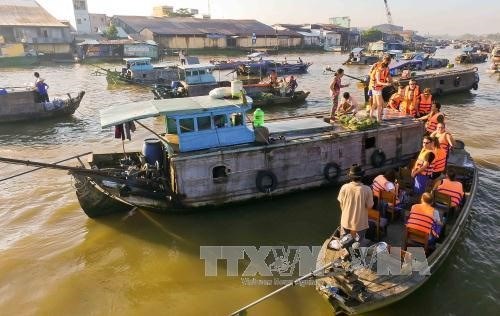
The Mekong Delta city of Can Tho enjoyed strong growth in tourism last year due to a series of international political and cultural events and traditional festivals, according to the municipal Department of Culture, Sports and Tourism.

Visitors
at Cai Rang Floating Market in Can Tho city (Source: VNA)
The number of tourist arrivals surged 40 percent to 7.5 million, while tourism
revenues rose 61 percent to 2.9 trillion VND (127.6 million USD).
The political, cultural and tourism events the city hosted included the APEC
Food Security Week, Vietnam-Japan Culture and Trade Exchange, and the Southern
Traditional Cake Festival.
The tourism sector is focusing on developing river-based tourism, especially
upscale products such as three- to five-star cruise ships, Le Minh Son, deputy
director of the department, said.
It is encouraging investors to develop inter-provincial and international
river-based tours, he said.
The tours are designed to take in historical and cultural relics, traditional
craft villages, and ecological and spiritual destinations.
Last year the neighbouring province of An Giang attracted 7.3 million visitors,
up 12 percent, earning revenues of 3.7 trillion VND (162.8 million USD).
The province is the centre of spiritual tourism in the south, with people
flocking especially to Ba Chua Xu Temple in Chau Doc town.
Kiên Giang province, with its beautiful landscapes, islands such as Phu Quoc,
archipelagoes such as Nam Du and Ba Lua and the U Minh Thuong National Park,
attracted more than six million visitors last year.
The province’s tourism revenues were worth more than 4.58 trillion VND (201.52
million USD), the highest in the delta.
Source: VNA
A diverse chain of eco-tourism and resort destinations concentrated in Hoa Binh city and the districts of Tan Lac, Da Bac, and Luong Son… Along with the launch of several key high-quality resort tourism projects, these developments have reshaped the landscape and enhanced the appeal of Hoa Binh as a travel destination.
Boasting diverse terrain, a mild climate, and rich natural resources, Cao Phong district is increasingly asserting its place on Vietnam’s tourism map, attracting both domestic and foreign visitors. The district is renowned for its stunning landscapes, majestic mountains, a crystal-clear hydropower lake, and the unique cultural identity of local ethnic groups.
With its pristine landscapes, unique cultural heritage of Muong ethnic minority, and an expanding range of visitor experiences, Tan Lac district of Hoa Binh has fast become a captivating destination for both domestic and international tourists.
Until now, Sung village in Cao Son commune, Da Bac district remains the only Dao ethnic community in Hoa Binh province to develop a community-based tourism model. Beyond its untouched natural landscapes, cultural identity serves as the cornerstone attraction for visitors.
Alongside the diverse cultural identities of the Kinh, Muong, Tay, Thai, Dao, and Mong ethnic people, Hoa Binh province is also renowned as the "capital" of the northwestern Vietnamese cuisine, offering unique and distinctive dishes. At festivals, during Lunar New Year (Tet), or on significant family or community occasions, special dishes are prepared, leaving a lasting impression on visitors.
A Phong Linh (Yellow Tabebuia) flower garden in Thang village, Thach Yen commune, Cao Phong district is currently in full bloom, drawing a large number of visitors.



